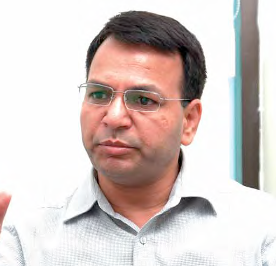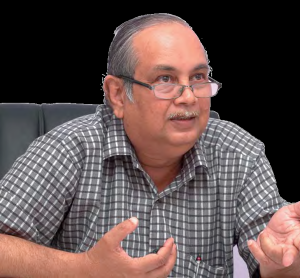
Mr. Vishal Gupta,
VP- Global Healthcare Solutions Unit
CISCO Systems (India) Private Limited

With technological innovations making its way through, India is also eager on adopting innovations and is definitely taking a step forward in shaping the healthcare system, says Mr. Vishal Gupta, VP- Global Healthcare Solutions Unit CISCO Systems (India) Private Limited In conversation with Sruti Ghoshal, ENN.
It is said that telemedicine is the way to bridge the urban-rural divide in Indian healthcare.What is your opinion? How do you find the scope of telemedicine services in India today?
Telemedicine is about providing equitable assets to healthcare. No matter where the doctor is and where the patient is telemedicine can bridge that gap. We know that 70 percent of the population still lives in villages, only about 10 percent of the specialists are in the villages and about 20 percent primary doctors in those villages. The government tried to introduce a rule whereby doctor had to serve a particular village but that didnt work out. So the only way out is to introduce innovations in the ICG HIS space, this will enable the doctor to operate from wherever they want to be and bridge the gap.
I think in India there is a lot of scope for telemedicine services. We call it tele-presence or care at a distance where our main aim is to make it more user friendly and affordable and something which can be used at scale rather than making it more technologically complicated. So the need is huge in India with 25,000 primary health centres and most of these PHCs are not equipped with specialists and many of them dont even have a primary doctor and for this reason the villagers have to go to the district hospitals and in the process they lose a lot of time. The challenge is if the person doesnt get the help at the right time then the cost increases exponentially.
| In China people have a single health card. Whenever they visit any hospital this card helps them to know where the reception is and likewise information. But when it comes to India there are so many doors to knock to reach to the desired location |
Till now how many states have taken up your healthcare solutions?
It has been deployed in parts of Karnataka, Madhya Pradesh, and in the Tibetan settlements of Bihar and Chhattisgarh. We think the horizon of telemedicine should spread out to more states as the need is there in every part of India and just because a state doesnt have proper healthcare system the people shouldnt be devoid of the essential treatment. The need for healthcare doesnt go away just because you cant build a hospital there. This creates a lot of social unrest and a lot of challenges.

Give us an overview of care at a distance programme launched by CISCO.
We had three fold focus when we launched care at a distance programme.One, the interface between the patient and the doctor should be very interactive; they should feel they are right next to each other so that the trust is built. We have also worked on providing clarity in the video managing the low bandwidth issue. Second, for telemedicine to scale, it has to integrate with all the medical devices. If the medical devices like stethoscope, blood pressure or an ECG could be integrated then the proper diagnosis can be done. The third challenge that we faced was how to make these things very easy to use. We designed it in such a way that the doctor could set it up in one click and also allow the patient to check on the availability of the doctors.
Apart from telemedicine you have HIS products and solutions too. What are the new products and solutions you have introduced in the HIS space?
We have come up with a lot of solutions in this space. We have come up with an offering called connected healthcare.In connected healthcare we validate the HIS system on our infrastructure.We make sure the HIS system runs on a very fast processor or on cloud so that they are easy to access. Security is another key factor where we have to ensure the right data being accessed by the right person. So CISCO has a lot of security assets which are enabled in these aspects. We have also worked on collaborative healthcare system whereby a number of doctors can collaborate and provide solution to a patient.
Experts say he future for cloud HIS solutions will capture the markets soon. What is your opinion on this?
In healthcare system cloud is very powerful. We are working with heads of many countries like China, Turkey etc. the advantage of cloud is that instead of deploying systems in every hospital cloud will accelerate it faster.For example we were given the responsibility of deploying cloud system in the Sichuan district which had undergone a natural calamity and didnt have any proper healthcare system.So there was a centralised system with which the other hospitals were connected. Now they are planning to go completely paperless where every data will be stored in a card. All the procedures are taken care by that single card. So we can jump start an entire generation with much more elasticity and at a much lower cost.
Do you think the healthcare facilities in the government hospitals can be made better with HIS and telemedicine?
In China the HIS system has made their life much easier. They are carrying out around 1000 OPDs per day with so much ease. The Indian governments response to these solutions is always very positive but in action it remains to be of seen how long it takes. But of late the government has been taking up initiative and in the 12th planning commission a huge amount of fund has been allocated to the healthcare system.
Till today medical education lacks technology. Do you have any future plans of extending your solutions to the medical institutes?
In medical education the core focus is on teaching. Many times, these institutes lack cases for the students to learn. In that case we can broadcast a particular surgery to many people.For example if a cardiologist is conducting a heart surgery he can always broadcast it at a time to three different places, i. e to the patient,medical institutes, to other doctors as well.
Be a part of Elets Collaborative Initiatives. Join Us for Upcoming Events and explore business opportunities. Like us on Facebook , connect with us on LinkedIn and follow us on Twitter , Instagram.




